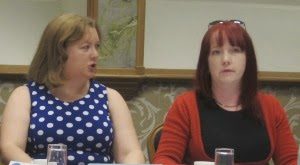
Health and social care integration is both an opportunity and a threat, so it is important that UNISON branches in Health and Local Government are fully engaged in the process, to maximise the benefits for our members and service users, and to address any concerns.
That was the message from Tam Waterson, Chair of Scottish Health and Mark Ferguson, Chair of Scottish Local Government, as they met with representatives from the Grampian Health Branch and Aberdeen City and Aberdeenshire UNISON on Tuesday 1st July. Willie Duffy, Regional Organiser was also in attendance.
Tam and Mark have been charged by the UNISON leadership to visit Health and Local Government branches across Scotland to monitor progress and offer advice on the integration agenda.
They emphasised the importance of local branches in Health and Local Government meeting regularly and ensuring that there is trade union representation on transitional groups and shadow boards, as integration moves forward.
“This is the best way to make sure that our members’ terms and conditions are protected, and to influence how Health and Social Care integration is implemented locally,” said Tam. “As trade unions we have a right to be represented so we need to make sure that happens.”

Aberdeenshire Branch Secretary, Inez Teece and Sandra Dee Masson of Grampian Health Branch said that within Aberdeenshire the integration agenda is quite well on. A body corporate has been established and a Chief Officer, Adam Coldwell, has been appointed. There are representatives from both branches on the Transitional Leadership Group and also on the four Engagement and Involvement sub groups. A series of Roadshows has been held, organised by the Chief Executive, but with trade union input.
Both Mark and Tam warned that although the integration of health and social care could deliver benefits, one of the major concerns is the third sector input into the integration agenda, both at Government level and locally.
“There is no doubt that the third sector is seen as a cheap option, as they don’t have to pay the living wage, and can keep costs down through low pay and poorer conditions of service for staff,” said Mark. “That is why the Ethical Care Charter is so important as once signed up it commits councils to ensuring that services are only commissioned from third sector employers who pay the living wage.” So far Mark’s council, Renfrewshire, is the only one to have signed up in Scotland.

“The third sector is lobbying hard to take over services,” added Tam. “We need to be vigilant to this, especially as many of the services transferring from Local Government will already be delivered by the private and voluntary sector, like home care in some areas, and care and day services in others.”
Both Inez and Sandra Dee agreed that there is a need to keep an eye on this locally to make sure that outsourcing is not on the horizon, especially as currently most of home care in Aberdeenshire is delivered in-house.
“We have begun discussions with the council on signing up to UNISON’s Ethical Care Charter,” said Inez. “We will be taking this forward with the council as its minimum standards will provide some protection for our members in home care, and service users.”
